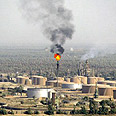

Iraq reports Iranian incursion; Tehran denies
Senior Baghdad official said Iranian soldiers crossed into Iraqi territory, took up position at southern oilfield whose ownership is disputed by Islamic Republic. Tehran's semi-official Mehr news agency quotes National Iranian Oil Company as rejecting report
A senior Iraqi official said Iranian soldiers crossed into Iraqi territory on Friday and took up position at a southern oilfield whose ownership is disputed by Iran, but Tehran denied the report.
Iraqi Deputy Interior Minister Ahmed Ali al-Khafaji said the incursion was the latest in a series this week at the Fakka oilfield, around 300 kilometers (185 miles) southeast of Baghdad, in Maysan province.
"At 3:30 this afternoon, 11 Iranian (soldiers) infiltrated the Iran-Iraq border and took control of the oil well. They raised the Iranian flag, and they are still there until this moment," he told Reuters.
Iran's semi-official Mehr news agency later quoted the National Iranian Oil Company (NIOC) as rejecting the report.
"The company denies Iranian soldiers taking control of any oil well inside Iraqi territory," Mehr quoted the NIOC as saying.
Oil prices rose after the first reports of an incursion.
Khafaji said Baghdad had taken no military action and stressed it would seek a measured, diplomatic response to the situation. "We are awaiting orders from our leader."
"This well is located on Iraqi land, 300 meters (yards) inside Iraq. It is disputed between Iran and Iraq. There was an agreement between the two countries' oil ministers to fix this problem diplomatically," he said.
An Iraqi security source in Maysan province, speaking on condition of anonymity, said Iranian troops had made their way on Thursday into the Fakka oilfield area, located just on the Iraqi side of the two countries' long desert border, then withdrawn after several hours.
The benchmark US light crude oil future moved to a high of $74.69 per barrel at 1414 GMT, up from $73.31 at 1108 GMT before the first reports, and was $73.45 at 1700 GMT.
The incident came a few days after the Iraqi Oil Ministry awarded leading global energy firms contracts to operate seven oil fields, in the second tender since the 2003 US invasion.
Iraq, whose underperforming oil sector is scarred by years of sanctions and war, predicts a host of development deals in the works will eventually lift output to 12 million barrels per day, putting it nearly on par with global leader Saudi Arabia.
It would be a wave of long-awaited investment in Iraq. But as US troops prepare to withdraw by 2012, firms must grapple with violence, political feuds and legal wrangles dogging large-scale investment deals.
Flashpoints
The government of Prime Minister Nuri al-Maliki has been struggling to respond to a spate of attacks, the last of which killed up to 112 last week in Baghdad, aimed at destabilizing the country ahead of March 7 national elections.
Ties between Iraq and neighboring Iran, which fought an eight-year war in the 1980s, have improved since a Shiite-led government took over in Baghdad following the ousting of Sunni Arab leader Saddam Hussein in 2003.
Yet tensions have flared in inhospitable desert regions like eastern Maysan, just one of many flashpoints of continuing disagreement over shared borders between the majority Shiite Muslim neighbors.
The bilateral relationship is all the more delicate given Washington and Tehran's standoff over Iran's nuclear program and the presence of 115,000 US soldiers on Iraqi soil.
A source in the Iranian embassy in Baghdad said he had no information about any incursion.
"If such a thing had happened, they would have told us," he said, referring to the Iranian government in Tehran.
Iraqi Interior Minister Jawad al-Bolani told al-Arabiya, "Iraq will not give up its oil wealth, no matter the reason."
Iraqi government spokesman Ali al-Dabbagh said ministers would meet this evening and make a statement after discussing the issue.
Together with Bazargan and Abu Gharab, Fakka is part of the so-called Maysan Fields, which have an estimated 2.463 billion barrels of reserves.
According Iraq's Oil Ministry, oil output in the Fakka area began in the 1970s but was suspended during the Iran-Iraq war.
Iraq offered the Maysan oilfield complex to global energy firms in its first postwar development contract auction in June.
But a Chinese consortium, the sole group to bid on the fields, declined the Oil Ministry's proposal for fees.















